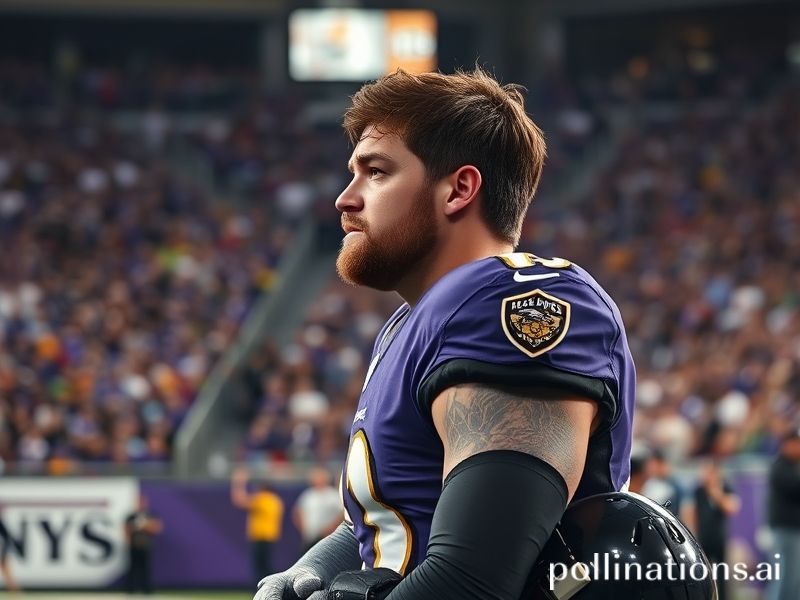Mark Andrews: The Tight End Whose Sideline Scare Became a Global Rorschach Test
Mark Andrews: The Tight End Who Became a Geopolitical Weather Vane
By Dave’s Locker International Affairs Desk
MUNICH—Somewhere between the Bavarian pretzel carts and the steins of overpriced lager, the name “Mark Andrews” keeps bubbling up in conversations that have absolutely nothing to do with American football. Last autumn, when the Ravens’ tight end collapsed on a London sideline, the ripple effect was felt far beyond the NFL’s transatlantic marketing blitz. Within minutes, #Andrews trended in seven languages, Bucharest bookies scrambled the in-game prop odds, and a crypto-bro in Singapore liquidated a non-fungible “health status token” that had been pegged—God help us—to Andrews’ blood-oxygen levels. If you blinked, you missed the moment when a 28-year-old from Scottsdale became a proxy indicator for late-stage capitalism’s vital signs.
The global fascination isn’t really about Andrews himself—he’s merely the latest human data point in the planet’s never-ending quest to monetize every heartbeat. Instead, he’s a convenient vessel for every armchair epidemiologist, geopolitical gambler, and content farm from Lagos to Lahore. When ESPN cut to commercial in the U.S., Al-Jazeera was already running chyron updates in Arabic; by the time the ambulance reached University College Hospital, Chinese social-media sleuths were cross-referencing his oxygen mask model with domestic stock prices of the manufacturer. Somewhere, a Swiss hedge-fund algorithm bought 40,000 shares of said company because sentiment analysis tagged the brand as “heroic.” The fact that Andrews was fine within 24 hours is almost beside the point; panic is the commodity, and it exports beautifully.
Europe, ever eager to feel relevant in American cultural hegemony, seized the moment. German tabloids diagnosed him with “Kollaps durch Übertraining,” which sounds far more dramatic than “cramping.” French intellectuals debated whether the incident proved the inherent violence of neo-liberal sport. Meanwhile, the British—ever nostalgic for empire—wondered if American football might finally replace soccer as the opiate of the masses, conveniently forgetting that their own national team is currently the opiate of disappointment.
In the Southern Hemisphere, the story took on darker hues. Argentine sports radio compared Andrews’ collapse to Maradona’s final years, grafting Latin fatalism onto a routine medical episode. South African pundits used it to argue that the Global North exports not just streaming services, but also cardiovascular risk. An Australian morning show tried to spin it as proof that their rugby codes are “tougher,” ignoring the fact that their players regularly exit the field looking like human lasagna. The irony, of course, is that Andrews’ brand of controlled violence is meticulously choreographed—like Kabuki with pads—whereas a Wallabies scrum can devolve into a Darwinian free-for-all.
Back in the States, the reaction was predictably therapeutic. Cable networks queued up trauma counselors, self-help authors, and that one former linebacker who now sells ayahuasca retreats. But the real money moved offshore: European sportsbooks offered prop bets on whether Andrews would score a touchdown in his first game back (he did), while Asian fantasy apps created a derivative market for “player resilience indices.” Even the Vatican got dragged in when a Jesuit podcast asked if praying for athletes counts as idolatry; the answer, delivered in five languages, was a diplomatic shrug.
What does it all mean? Simply that Mark Andrews—genial, Mormon, 6-foot-5—is the latest proof that modern celebrity is less about the person than about the world’s desperate need to project meaning onto a moving body. In an era when borders are closing but data flows like cheap wine, a medical timeout in London becomes a Rorschach test for every anxiety we can’t otherwise sell: health, nationalism, late-capitalist spectacle, and the creeping suspicion that we’re all just one dehydrated moment away from trending worldwide.
So next time you see Andrews haul in a seam route, remember you’re not just watching a catch; you’re witnessing a live feed of humanity’s collective neuroses, neatly wrapped in purple and black. And if the stock of electrolyte-drink companies spikes the moment he sips on the sideline—well, that’s just the free world doing what it does best: monetizing mortality in real time.







